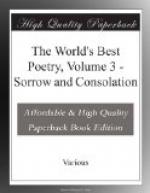A change came o’er the spirit of my dream.
The wanderer was alone as heretofore,
The beings which surrounded him were gone,
Or were at war with him; he was a mark
For blight and desolation, compassed round
With hatred and contention; pain was mixed
In all which was served up to him, until,
Like to the Pontic monarch of old days,
He fed on poisons, and they had no power,
But were a kind of nutriment; he lived
Through that which had been death to many men,
And made him friends of mountains: with the stars
And the quick Spirit of the universe
He held his dialogues; and they did teach
To him the magic of their mysteries;
To him the book of Night was opened wide,
And voices from the deep abyss revealed
A marvel and a secret.—Be it so.
My dream was past; it had no further change.
It was of a strange order, that the doom
Of these two creatures should be thus traced out
Almost like a reality,—the one
To end in madness—both in misery.
LORD BYRON.
ALAS! HOW LIGHT A CAUSE MAY MOVE.
FROM “THE LIGHT OF THE HAREM.”
Alas! how light a cause may move
Dissension between hearts that love!
Hearts that the world in vain has tried,
And sorrow but more closely tied;
That stood the storm when waves were rough,
Yet in a sunny hour fall off,
Like ships that have gone down at sea,
When heaven was all tranquillity!
A something light as air,—a look,
A word unkind or wrongly taken,—
O, love that tempests never shook,
A breath, a touch like this has shaken!
And ruder words will soon rush in
To spread the breach that words begin;
And eyes forget the gentle ray
They wore in courtship’s smiling day;
And voices lose the tone that shed
A tenderness round all they said;
Till fast declining, one by one,
The sweetnesses of love are gone,
And hearts, so lately mingled, seem
Like broken clouds,—or like the stream,
That smiling left the mountain’s brow,
As though its waters ne’er could
sever,
Yet, ere it reach the plain below,
Breaks into floods that part forever.
O you, that have the charge of Love,
Keep him in rosy bondage bound,
As in the Fields of Bliss above
He sits, with flowerets fettered round;—
Loose not a tie that round him clings,
Nor ever let him use his wings;
For even an hour, a minute’s flight
Will rob the plumes of half their light.
Like that celestial bird,—whose nest
Is found beneath far Eastern skies,—
Whose wings, though radiant when at rest,
Lose all their glory when he flies!
THOMAS MOORE.
BLIGHTED LOVE.
Flowers are fresh, and bushes green,
Cheerily the linnets sing;
Winds are soft, and skies serene;
Time, however, soon shall throw
Winter’s snow
O’er the buxom breast of Spring!




